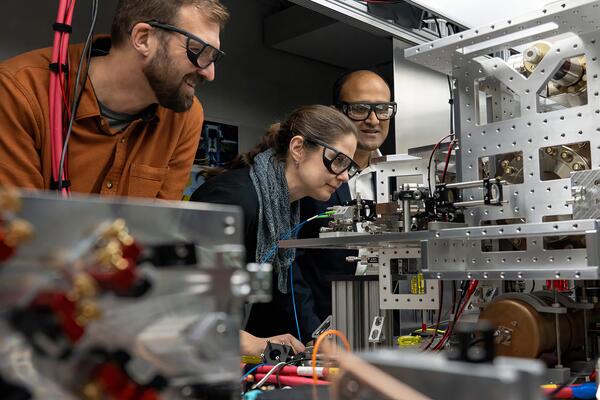
Meeting global challenges
Waterloo researchers tackle pressing issues at international science gathering

Waterloo researchers tackle pressing issues at international science gathering
By Staff Marketing and Strategic CommunicationsSome of the world’s most pressing challenges will be discussed in Chicago this week at a meeting that brings together top scientists and researchers from around the globe.
University of Waterloo researchers will be there, sharing their insights into what the virtual world can reveal about human health, how quantum information will shape our future, and the ethical implications of innovation.
World’s largest scientific society
 The American Academic for the Advancement of Science (AAAS) — the world’s largest general scientific society — draws thousands of academics each year to its annual meeting. The meeting is one of the most widely recognized science gatherings in the world, and takes place this year in Chicago from February 12 to 17.
The American Academic for the Advancement of Science (AAAS) — the world’s largest general scientific society — draws thousands of academics each year to its annual meeting. The meeting is one of the most widely recognized science gatherings in the world, and takes place this year in Chicago from February 12 to 17.
Researchers at this year’s meeting have been asked to address the theme: Meeting Global Challenges: Discovery and Innovation. It’s a natural fit for researchers across several Faculties at Canada’s most innovative university.
University of Waterloo participants
As a discussant on a panel about Responsible Innovation in a Global Context, Heather Douglas, a professor of philosophy in the Faculty of Arts will join an international panel of participants in the emerging Virtual Institute for Responsible Innovation. The goal of the group is to overcome geographical and political differences and come to agreement about the responsibilities that accompany innovation.
As part of a panel on Virtual Humans: Helping Facilitate Breakthroughs in Medicine, Terrance Stewart, a post-doctoral researcher at the Centre for Theoretical Neuroscience, will discuss how SPAUN — the world’s largest working model of the human brain — helps scientists better understand the effects of diseases including Parkinson’s and Alzheimer’s. Stewart’s cross-disciplinary focus spans systems design engineering, artificial intelligence, psychology and cognitive science.
Raymond Laflamme, executive director of Waterloo’s Institute for Quantum Computing will moderate a panel on Quantum Information Technologies, which includes David Cory, a professor of chemistry and Canada Excellence Research Chair in quantum information in Waterloo’s Faculty of Science. Cory will discuss two ways in which quantum mechanics leads to more powerful devices.
With the 2014 meeting about the begin, submissions are already being sought for the 2015 AAAS annual meeting taking place in San Jose, California. The theme, Innovations in Information and Imaging, offers another opportunity for Waterloo researchers to share their expertise on a global stage.

Read more
And a new model for how quantum research is shared — opening doors for the next generation of scientists and entrepreneurs

Read more
Here are the people and events behind some of this year’s most compelling Waterloo stories

Read more
Meet five exceptional Waterloo graduate students crossing the convocation stage as Class of 2025 valedictorians
The University of Waterloo acknowledges that much of our work takes place on the traditional territory of the Neutral, Anishinaabeg, and Haudenosaunee peoples. Our main campus is situated on the Haldimand Tract, the land granted to the Six Nations that includes six miles on each side of the Grand River. Our active work toward reconciliation takes place across our campuses through research, learning, teaching, and community building, and is co-ordinated within the Office of Indigenous Relations.